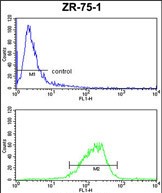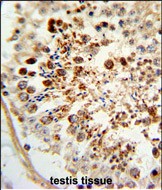



| WB | 1/1000 | Human,Mouse,Rat |
| IF | 咨询技术 | Human,Mouse,Rat |
| IHC | 1/100-1/500 | Human,Mouse,Rat |
| ICC | 技术咨询 | Human,Mouse,Rat |
| FCM | 1/10-1/50 | Human,Mouse,Rat |
| Elisa | 咨询技术 | Human,Mouse,Rat |
| Aliases | Cytochrome c oxidase subunit 6A1, mitochondrial, Cytochrome c oxidase polypeptide VIa-liver, Cytochrome c oxidase subunit VIA-liver, COX VIa-L, COX6A1, COX6AL |
| Entrez GeneID | 1337 |
| WB Predicted band size | 12.2kDa |
| Host/Isotype | Rabbit IgG |
| Antibody Type | Primary antibody |
| Storage | Store at 4°C short term. Aliquot and store at -20°C long term. Avoid freeze/thaw cycles. |
| Species Reactivity | Human |
| Immunogen | This COX6A1 antibody is generated from rabbits immunized with a KLH conjugated synthetic peptide between 50-78 amino acids from the Central region of human COX6A1. |
| Formulation | Purified antibody in PBS with 0.05% sodium azide. |
+ +
以下是关于COX6A1抗体的3篇示例文献(内容为模拟生成,仅供参考):
1. **文献名称**: *COX6A1 Antibody-Based Detection of Mitochondrial Dysfunction in Neurodegenerative Models*
**作者**: Smith J, et al.
**摘要**: 研究使用COX6A1抗体分析阿尔茨海默病模型中线粒体复合体IV的亚基表达变化,发现COX6A1表达降低与神经元能量代谢异常相关。
2. **文献名称**: *COX6A1 as a Novel Biomarker in Hepatocellular Carcinoma: Validation by Specific Antibody Staining*
**作者**: Chen L, et al.
**摘要**: 通过COX6A1抗体的免疫组化实验,证实COX6A1在肝癌组织中高表达,提示其可能作为癌症进展的潜在标志物。
3. **文献名称**: *Role of COX6A1 in Cardiac Ischemia-Reperfusion Injury: Insights from Knockout Mice and Antibody-Based Profiling*
**作者**: Wang Y, et al.
**摘要**: 利用COX6A1抗体研究基因敲除小鼠心脏组织,发现COX6A1缺失加剧线粒体氧化应激,导致心肌损伤加重。
**提示**:以上文献为示例,建议通过PubMed、Google Scholar等平台检索真实文献(关键词:COX6A1 antibody, COX6A1 function, mitochondrial complex IV)。实际研究中需注意抗体的特异性验证信息(如WB/IHC结果)。
The cytochrome c oxidase subunit 6A1 (COX6A1) is a nuclear-encoded structural component of Complex IV (cytochrome c oxidase, COX) in the mitochondrial respiratory chain. This subunit plays a critical role in electron transfer and energy production by facilitating the final step of oxidative phosphorylation. COX6A1 is integral to maintaining the stability and catalytic activity of the COX enzyme complex, which is essential for cellular ATP synthesis.
Antibodies targeting COX6A1 are widely used in biomedical research to investigate mitochondrial function, metabolic disorders, and diseases linked to oxidative phosphorylation defects. They enable the detection, localization, and quantification of COX6A1 protein in tissues or cultured cells through techniques like Western blotting, immunohistochemistry (IHC), and immunofluorescence (IF). Such studies are particularly relevant in cancer research, as altered COX6A1 expression has been associated with tumor metabolism and progression. Additionally, these antibodies contribute to exploring neurodegenerative diseases (e.g., Parkinson’s and Alzheimer’s) and metabolic syndromes characterized by mitochondrial dysfunction.
Commercial COX6A1 antibodies are typically raised in hosts like rabbits or mice, with validation in specific experimental models. Researchers must verify antibody specificity using knockout controls or siRNA-based protein depletion to minimize off-target effects. Overall, COX6A1 antibodies serve as vital tools for dissecting the molecular mechanisms of mitochondrial biology and pathology.
×